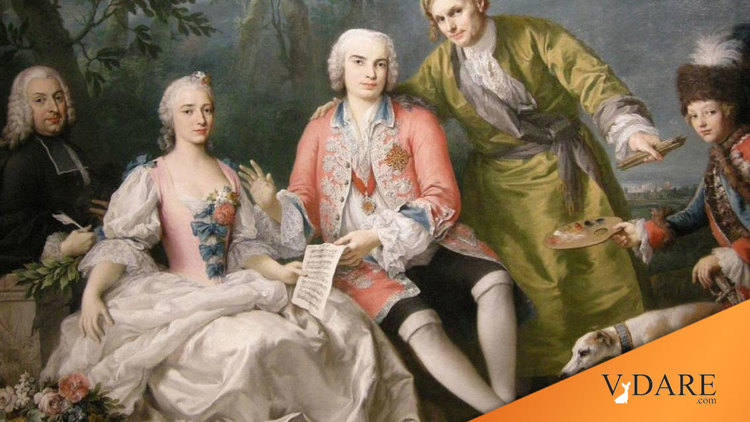
Opera, The Transgendered And Castrati: Back To The Fluid Future?
By Steve Sailer
05/30/2022
Opera, traditionally, could be Woke in that it’s very fluid about body size and age (225 pound and 52-year-old women are more likely to get the biggest roles, such as beautiful young Isolde), and to a lesser extent, sex (adult women normally play young boys’ roles for reasons similar to why Bart Simpson is voiced by a woman). As during the Great Awokening, opera relies on the forgiveness inherent in Let’s Pretend.
But the reason for this fluidity in opera between who the characters are supposed to be and who the singers who play them are is not due to Representation or Diversity or pity or whatever, but to ruthless meritocracy: on average, hefty folks of a certain age can blast it out better than good-looking young people.
Fortunately, one form of meritocratic competition was completely excised from opera after its peak in popularity 300 years ago: boys are no longer allowed to improve their chances of an adult singing career by being castrated before puberty.
The large majority of operas in the current repertoire are post-castrato craze. The Enlightenment (outside France, which disdained castrati) thought of castrati as excellent leading men for operas about ideal virtuous heroes. But the now-disdained Romantic Era thought that was stupid and kind of sick. The last castrato role was composed in 1824. Indeed, the most famous operas from the 1780s through the 1910s are intensely heterosexual.
You can see the changeover in Mozart (1756-1791). His old-fashioned boring operas like The Clemency of Titus featured roles written for castrati. But his great late stuff like Cosi Fan Tutte (more or less, All Women Do It) and Don Giovanni are the over-the-top heterosexual. Mozart’s peak librettist was Lorenzo da Ponte, a Jewish-born Catholic priest and friend of Casanova who was defrocked for being a pimp and wound up an Ivy League professor.
But the way things are going, perhaps the future will tend toward the gender-fluidity of the past.
From The New York Times arts section:
‘I Would Love to Sing Lucia’: A Male Soprano Comes Into His Own
Samuel Mariño, a singer with a rare voice type in opera, is making his Decca album debut with a glimpse at a more gender-fluid future.
So I jumped in figuring this article about opera’s more gender-fluid future wouldn’t mention opera’s grotesque gender-fluid past. But no, they go there. A lot.
By J.S. Marcus
May 27, 2022BERLIN — Samuel Mariño is a rarity in opera: a true male soprano.
Rather than relying on falsetto as a countertenor would, Mariño, 28, is able to comfortably sing high notes with his chest voice. Now he is branching out from Baroque parts originally written for castrati. A big step in that direction: “Sopranista,” his debut album on the Decca label, which is out on Friday.
He has his eye on a variety of roles, including Sophie, the ingénue of Strauss’s “Der Rosenkavalier,” and Dvorak’s Rusalka, he said in an interview, with the aim of sending a message that classical music should be “open to all communities,” including a multiplicity of genders. And “Sopranista,” named after the Italian term for a male soprano, offers a glimpse at that more fluid future. …
The album opens with Cherubino’s aria “Voi che sapete,” from Mozart’s “The Marriage of Figaro.” Cherubino, originally written for a female soprano, is now a signature trouser role — an often young male character performed by a mezzo-soprano.
Mariño, who was born in Venezuela and is based here in Berlin, didn’t lose the boyish aspects of his voice at puberty; it only “partially broke,” he said. With a high speaking voice, life as a teenager — a gay one, at that — was difficult. …
… He then spent his early career specializing in castrato roles.
Unlike castrati of the 17th and 18th centuries — always beardless, and typically tall and paunchy — Mariño is short and lithe, and was already sporting a five o’clock shadow on a recent afternoon walk with Leia, his Cavalier King Charles spaniel.
At his apartment, Mariño spoke about his new album, his desire to go beyond castrati roles and his campaign to free himself — along with classical music generally — from the confines of traditional gender boundaries. …
But why wait around for natural accidents like this guy? We now have puberty blockers and a rampant ideology promoting their use, so perhaps the future of opera, like the past, will be more fluid?
